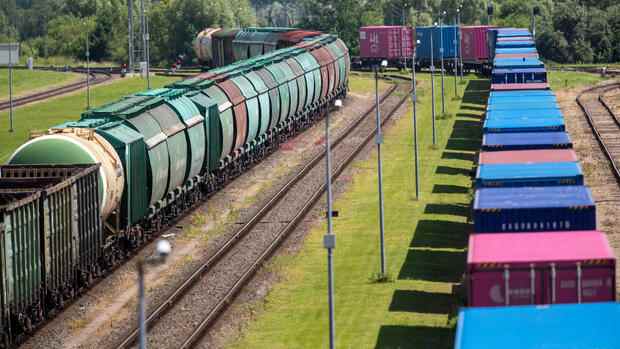As early as mid-June, Lithuania restricted the transit of certain sanctioned goods to the Russian exclave.
(Photo: AP)
Riga, Brussels In the dispute over the transit of sanctioned goods to the Russian exclave of Kaliningrad, there has been no relaxation so far. Kremlin spokesman Dmitry Peskov said on Thursday, according to the Russian news agency Interfax, that talks were being held through various channels to solve the problem of the transit of goods. “Of course we hope for the best, but prepare for the worst,” Peskow is quoted as saying.
Since mid-June, Lithuania has prohibited the overland transport of steel and metal products to Kaliningrad. The government in Vilnius is referring to the EU’s fourth package of sanctions against Russia. In March, the Europeans decided to ban the import of these products from Russia. The government in Vilnius argues that they are only implementing what has been jointly decided. From the beginning she had emphasized that she was acting in close consultation with the EU Commission. Moscow described the restrictions as “illegal”.
In order to defuse the situation, the EU Commission had announced that it would issue a new “Guidance” before Sunday when the next product groups would fall under the sanctions regime. This is an aid to interpreting how the sanctions are to be applied. But so far the document is still a long time coming.
The date for this was deliberately chosen: As part of the fourth sanctions package that Lithuania is relying on, a transit ban on cement, alcohol and other products is to come into effect this Sunday, followed by the transit ban on coal and other solid fossil fuels on August 10 and a ban on Russian oil from December 5th.
Top jobs of the day
Find the best jobs now and
be notified by email.
But Lithuania’s interpretation is not shared by all member states. In Brussels it was said recently that the EU Council had never intended to prevent the transit of Russian goods to Kaliningrad. The Federal Government is also of the opinion that this is intra-Russian trade and that the sanctions should therefore not be applied – even if the transport takes place through Lithuanian territory and thus the EU.
“Putin is only impressed by strength”
From the point of view of the Eastern Europeans, however, there is no doubt: transit traffic falls under the sanctions regime. This is expressly provided for in the legal texts, says an Eastern European diplomat. It is also politically wrong to give in now. “Putin is only impressed by strength,” the diplomat continued. “If we show weakness, he will immediately come up with the next demand.” Under no circumstances should the EU give the impression that it is allowing Russia to put individual member states under pressure. “It’s about the sanctions policy of the EU, not that of a single country – we have to make that clear to the Russians.”
>> Read here: “After Ukraine we would be next”: Lithuania’s fears about an escalation of the war
In Eastern Europe and the Baltic States, the development of the dispute is being closely monitored. On Thursday, the Presidents of Poland and Lithuania emphasized the readiness of their two countries to defend themselves in the area bordering Kaliningrad. In Lithuania’s neighboring country of Latvia, Defense Minister Artis Pabriks announced on Tuesday that conscription for men between the ages of 18 and 27 would be reintroduced – 15 years after it was abolished.
“We are assured that the issue should be resolved in the near future,” the Russian Foreign Ministry spokeswoman said. Meanwhile, Asta Skaisgiryte, chief foreign policy adviser to Lithuanian President Gitanas Nauseda, confirmed to Lithuanian media that the country’s diplomats were working with European Commission officials on a text to clarify the situation.
Nevertheless, Moscow is continuing to press: “If the situation does not stabilize in the next few days, Russia will take tough measures against Lithuania and the European Union,” said the spokeswoman. The only correct decision would be to ensure “unimpeded transit”.
More: Fear of escalation: Berlin urges concessions to Moscow.
